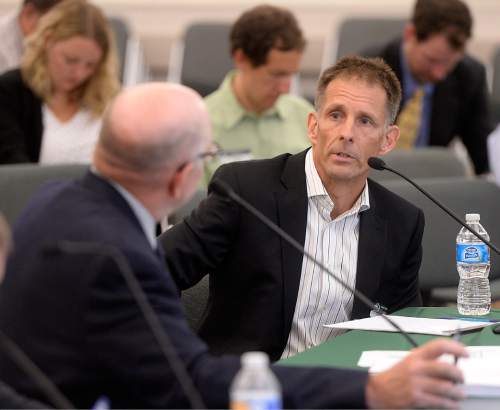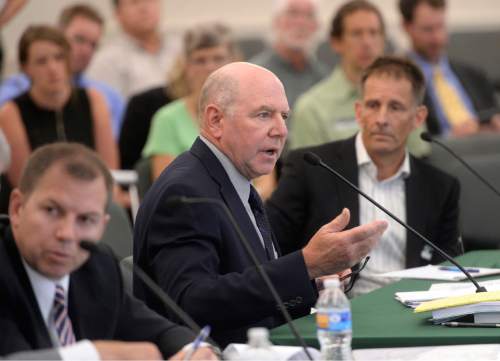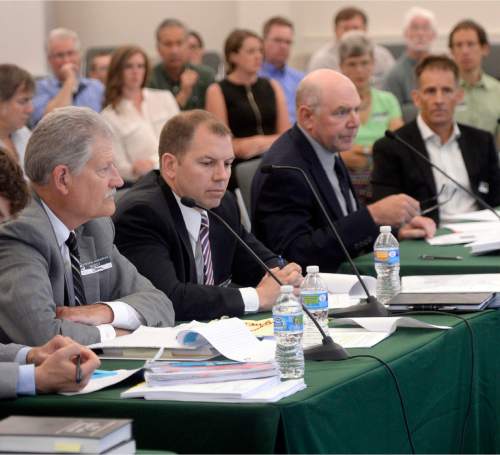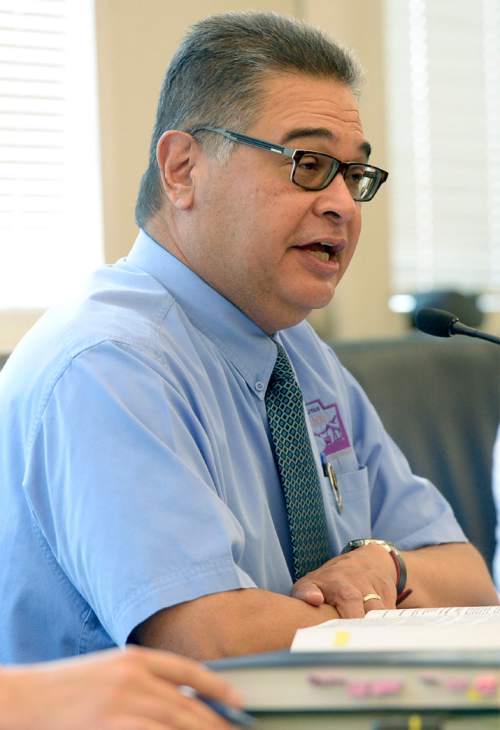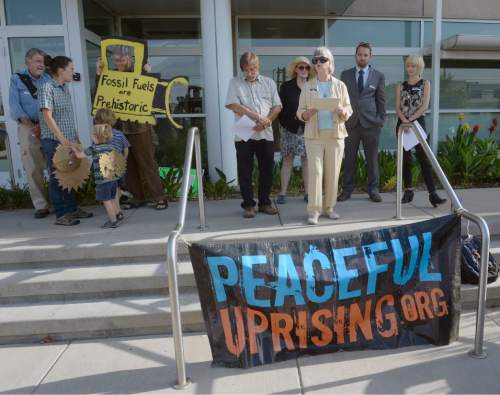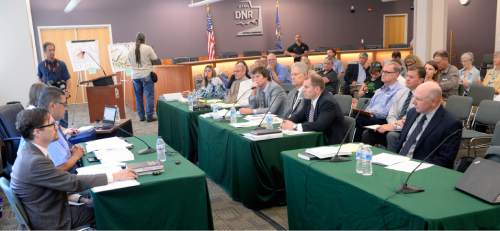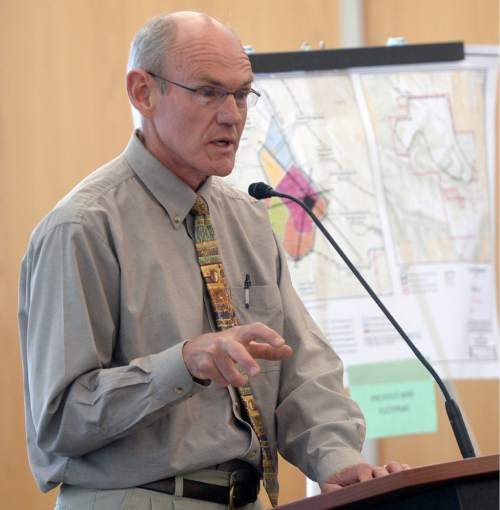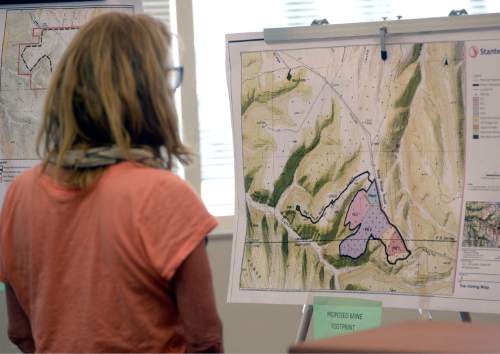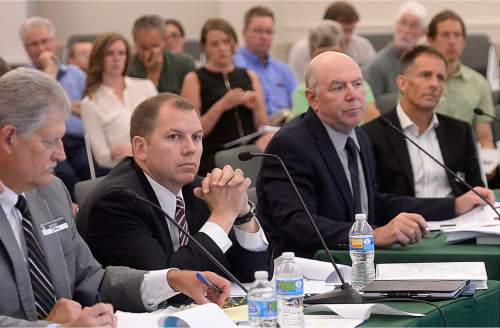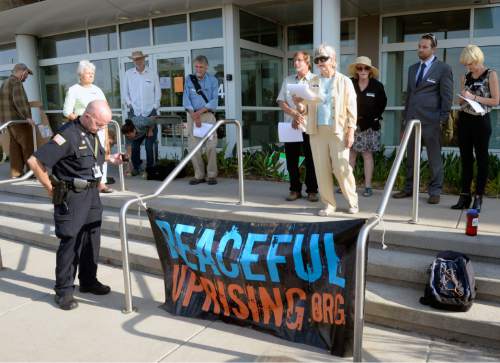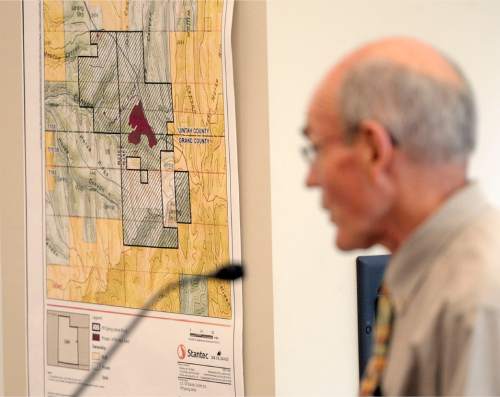Al Hartmann | The Salt Lake Tribune
Bill Johnson, a University of Utah geology professor, speaks about his water study of the are
Al Hartmann | The Salt Lake Tribune
Attorney Rob Dubuc, working on behalf of Living Rivers, speaks out at a crucial hearing Tuesd
Al Hartmann | The Salt Lake Tribune
Attorney John Davis and Barclay Cuthbert, Vice President of Operations with U.S. Oil Sands, l
Al Hartmann | The Salt Lake Tribune
John Baza, Director of Utah Division of Oil, Gas and Mining opens a crucial hearing Tuesday J
Al Hartmann | The Salt Lake Tribune
A small group from Peaceful Uprising and Utah Tar Sands Resistance and concerned citizens rea
Al Hartmann | The Salt Lake Tribune
Shea Wickelson, left, her husband Paul and their 3-year-old son Lev performed a skit on the s
Al Hartmann | The Salt Lake Tribune
Tar sands industry representatives, environmentalists and citizens attend a crucial hearing
Al Hartmann | The Salt Lake Tribune
Paul Baker with Utah Minerals Regulatory Program speaks at a crucial hearing Tuesday, June 30
Al Hartmann | The Salt Lake Tribune
Paul Wickelson and his sons Otis, 6, and Lev, 3, performed a skit on the steps of the Utah De
Al Hartmann | The Salt Lake Tribune
A person looks at a map with proposed tar sands mine footprint on the Uintah- Grand County li
Al Hartmann | The Salt Lake Tribune
Attorney John Davis and Barclay Cuthbert, Vice President of Operations with U.S. Oil Sands, l
Al Hartmann | The Salt Lake Tribune
A small group from Peaceful Uprising, Utah Tar Sands Resistance and concerned citizens read s
Al Hartmann | The Salt Lake Tribune
A small group from Peaceful Uprising, Utah Tar Sands Resistance and concerned citizens read s
Al Hartmann | The Salt Lake Tribune
A small group from Peaceful Uprising, Utah Tar Sands Resistance and concerned citizens read s
Al Hartmann | The Salt Lake Tribune
Paul Baker with Utah Minerals Regulatory Program speaks at a crucial hearing Tuesday, June 30
Al Hartmann | The Salt Lake Tribune
Bill Johnson, a University of Utah geology professor, speaks about his water study of the area around the PR Spring Mine on the Uintah-Grand County line at a crucial hearing Tuesday, June 30 at the Utah Division of Oil, Gas and Mining in the Utah Department of Natural Resources building in Salt Lake City. U.S. Oil Sands wants to expand their mining operation.
Al Hartmann | The Salt Lake Tribune
Attorney Rob Dubuc, working on behalf of Living Rivers, speaks out at a crucial hearing Tuesday, June 30 at the Utah Division of Oil, Gas and Mining at the Utah Department of Natural Resources building in Salt Lake City regarding the expansion of the PR Spring Mine on the Uintah-Grand County line.
Al Hartmann | The Salt Lake Tribune
Attorney John Davis and Barclay Cuthbert, Vice President of Operations with U.S. Oil Sands, left, and Rob Dubuc, attorney for Living Rivers, and Bill Johnson, University of Utah geology professor, right, speak out at a crucial hearing Tuesday, June 30 at the Utah Division of Oil, Gas and Mining in the Utah Department of Natural Resources building in Salt Lake City regarding the expansion of the PR Spring Mine on the Uintah-Grand County line.
Al Hartmann | The Salt Lake Tribune
John Baza, Director of Utah Division of Oil, Gas and Mining opens a crucial hearing Tuesday June 30 at the Utah Department of Natural Resources building in Salt Lake City regarding the expansion of the PR Spring Mine on the Uintah-Grand County line.
Al Hartmann | The Salt Lake Tribune
A small group from Peaceful Uprising and Utah Tar Sands Resistance and concerned citizens read statements and performed a skit on the steps of the Utah Department of Natural Resources before a crucial hearing Tuesday, June 30 at the Utah Division of Oil, Gas and Mining in Salt Lake City.
Al Hartmann | The Salt Lake Tribune
Shea Wickelson, left, her husband Paul and their 3-year-old son Lev performed a skit on the steps of the Utah Department of Natural Resources before a crucial hearing Tuesday, June 30 at the Utah Division of Oil, Gas and Mining in Salt Lake City.
Al Hartmann | The Salt Lake Tribune
Tar sands industry representatives, environmentalists and citizens attend a crucial hearing Tuesday June 30 at the Utah Board of Oil, Gas and Mining at the Utah Dept. of Natural Rescources building in Salt Lake City regarding the expansion of the PR Spring Mine on the Uintah-Grand County line.
Al Hartmann | The Salt Lake Tribune
Paul Baker with Utah Minerals Regulatory Program speaks at a crucial hearing Tuesday, June 30 at the Utah Division of Oil, Gas and Mining in Salt Lake City.
Al Hartmann | The Salt Lake Tribune
Paul Wickelson and his sons Otis, 6, and Lev, 3, performed a skit on the steps of the Utah Department of Natural Resources before a crucial hearing Tuesday, June 30 at the Utah Division of Oil, Gas and Mining in Salt Lake City.
Al Hartmann | The Salt Lake Tribune
A person looks at a map with proposed tar sands mine footprint on the Uintah- Grand County line at a crucial hearing at the Utah Division of Oil, Gas and Mining Tuesday, June 30 at the Utah Department of Natural Resources building in Salt Lake City.
Al Hartmann | The Salt Lake Tribune
Attorney John Davis and Barclay Cuthbert, Vice President of Operations with U.S. Oil Sands, left, and Rob Dubuc, attorney for Living Rivers and Bill Johnson, University of Utah geology professor, right, speak out at a June hearing at the Utah Division of Oil, Gas and Mining in the Utah Department of Natural Resources building in Salt Lake City regarding the expansion of the PR Spring Mine on the Uintah-Grand County line.
Al Hartmann | The Salt Lake Tribune
A small group from Peaceful Uprising, Utah Tar Sands Resistance and concerned citizens read statements and performed a skit with children on the steps of the Utah Department of Natural Resources as a security guard records them before a crucial hearing Tuesday, June 30 at the Utah Division of Oil, Gas and Mining in Salt Lake City.
Al Hartmann | The Salt Lake Tribune
A small group from Peaceful Uprising, Utah Tar Sands Resistance and concerned citizens read statements and performed a skit with children on the steps of the Utah Dept. of Natural Resources as a security guard records them before a crucial hearing Tuesday, June 30 at the Utah Division of Oil, Gas and Mining in Salt Lake City.
Al Hartmann | The Salt Lake Tribune
A small group from Peaceful Uprising, Utah Tar Sands Resistance and concerned citizens read statements and performed a skit with children on the steps of the Utah Department of Natural Resources as a security guard records them before a crucial hearing Tuesday, June 30 at the Utah Division of Oil, Gas and Mining in Salt Lake City.
Al Hartmann | The Salt Lake Tribune
Paul Baker with Utah Minerals Regulatory Program speaks at a crucial hearing Tuesday, June 30 at the Utah Division of Oil, Gas and Mining in Salt Lake City.


